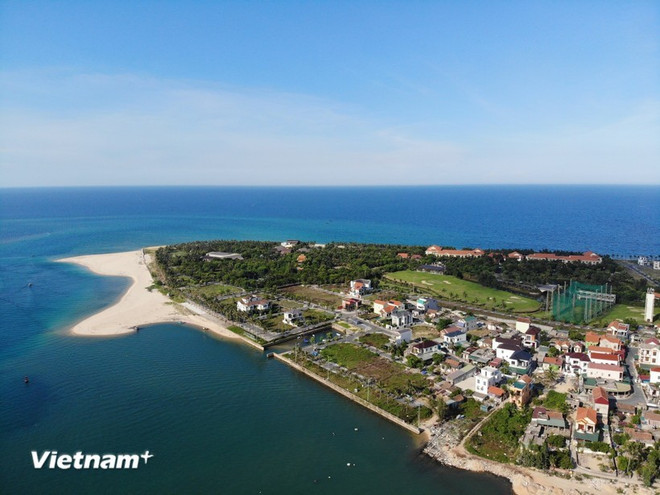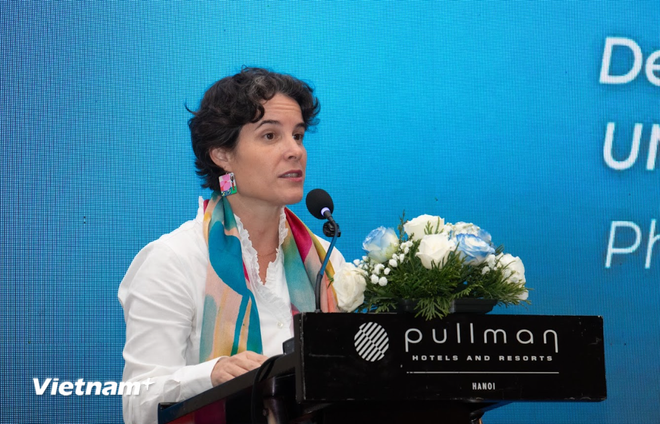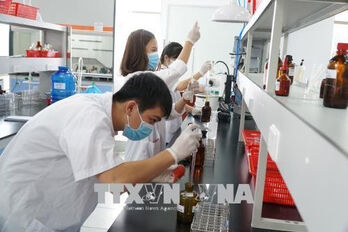As a global treaty on plastics is expected to come into being soon, the UN Development Programme (UNDP) has expressed confidence that Vietnam and other ASEAN nations will continue to spearhead innovative solutions to reduce marine plastic pollution.

Developing the blue economy is identified as a key driver of national development. (Illustrative photo: VietnamPlus)
Vietnam has identified developing the blue economy as one of the key drivers. In that context, integrated marine management also serves as a strategic pillar, enabling the country to harness marine economic potential sustainably, foster innovation in plastics reduction, protect the environment, and reinforce its position as a responsible maritime nation.
This message was highlighted at the “Innovation for Reducing Marine Plastic Pollution” programme, organised on September 11 by the Ministry of Agriculture and Environment in partnership with UNDP Vietnam.
Tackling marine plastic pollution through innovation
Nguyen Duc Toan, Director of the Vietnam Administration of Seas and Islands under the Ministry of Agriculture and Environment, noted that plastic pollution is a severe and transboundary challenge, posing a significant threat to coastal and marine ecosystems. Addressing it, he said, is not the responsibility of a single country, organisation, or community.
Facing that fact, the UNDP’s EPPIC project (“Ending Plastic Pollution through Innovation Challenge”) has been active since 2020, promoting innovative approaches to reduce ocean plastic pollution across ASEAN, with positive results.
In Vietnam, measures to prevent and mitigate marine plastic waste are explicitly outlined in the plan for implementing the Vietnam strategy for sustainable marine economy development and the national action plan for marine plastic waste management through 2030.
Since 2022, the EPPIC project received continued support from the Norwegian Government through the Norwegian Agency for Development Cooperation, scaling up innovative solutions in the region.
Under the project, the UNDP has collaborated with Vietnam Administration of Seas and Islands to develop a book on innovation in plastics. The publication underscores the role of innovation as one of the main drivers for effectively implementing policies on marine plastic reduction. It also provides guidance for communications about oceans and seas under the Prime Minister-approved programme through 2030, Toan noted.
Looking ahead, Toan emphasised the need for international support, active private sector engagement, and community participation to improve public awareness of sustainable marine development, promote consensus among relevant sides, and integrate policy, technology, and communication within a unified governance framework.
He also encouraged provinces to advance multi-stakeholder cooperation to tackle plastic pollution along the value chain, strongly transform the plastics management system, and facilitate investment in circular solutions and innovation, in line with the Politburo’s Resolution No. 57-NQ/TW on breakthroughs in science – technology development, innovation, and digital transformation.
Vietnam’s regional leadership recognised

Francesca Nardini, Deputy Resident Representative of UNDP in Vietnam. (VietnamPlus)
Francesca Nardini, UNDP Deputy Resident Representative in Vietnam, highlighted that beyond promoting innovation, EPPIC has supported policy making and inclusive approaches to plastic waste management in countries including Vietnam.
A major focus is to advance the Extended Producer Responsibility (EPR) to benefit informal workers, who play a vital role in waste collection and recycling.
The project has also assisted Vietnam in preparing for and participating in negotiations on the upcoming global plastics treaty, demonstrating the country’s pioneering role on the international stage, she continued.
In the context of the upcoming global plastics treaty, Nardini expressed the belief that Vietnam and other ASEAN countries are to continue leading innovative efforts to reduce plastic waste, building on the solid foundation established by EPPIC.
The EPPIC initiative has adopted a multidimensional approach, combining innovation, policy development, and regional cooperation to enhance local response to one of today’s most pressing environmental challenges.
Regional dialogue between Norway and ASEAN has further strengthened these efforts, showing that regional cooperation can drive innovation to have true effects, contributing to plastic waste reduction and sustainable ocean management at local, regional, and international levels.
At the event, participants reviewed the progress of plastics innovation during 2020–2025 and gave recommendations to increase investment in future opportunities.
Pitch sessions also enabled innovators to engage directly with businesses and investors. Experts from the Institute of Policy and Strategy for Agriculture and Environment, in collaboration with GIZ, shared methods for trading secondary plastics and textiles via exchange platforms,which is hoped to open new opportunities for the circular economy./.
VNA
Source: https://en.vietnamplus.vn/vietnam-leads-in-innovative-efforts-to-reduce-plastic-pollution-post329988.vnp
 Vietnam’s fertility plummets, workforce quality concerns mount: national survey
Vietnam’s fertility plummets, workforce quality concerns mount: national survey




